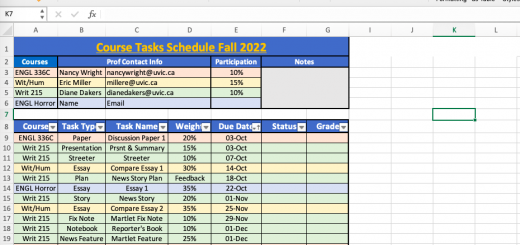‘Tis the Season of College ‘Burnout’: Six Ways to Deal with Academic Stress
Dear Readers,
 November is thought to be one of the most challenging months of the whole semester. It’s narrowing down on the final papers whilst keeping up with your never-ending readings; it’s the constant reminder of increasing expectations, decreasing sunlight, and an ever-present air of melancholy in most lecture halls.
November is thought to be one of the most challenging months of the whole semester. It’s narrowing down on the final papers whilst keeping up with your never-ending readings; it’s the constant reminder of increasing expectations, decreasing sunlight, and an ever-present air of melancholy in most lecture halls.
Ah, yes, sound familiar? It’s a burden that many students have to bear during their pursuit of higher education.
The Globe & Mail conducted a national survey documenting that “one-fifth of Canadian post-secondary students are depressed, anxious, or battling other mental health issues” (Globe & Mail 2018). Moreover, it emphasizes the increasing amount of post-secondary students in distress (Globe & Mail). Although many students trudge through this ordeal, the ways in which we as students experience the quintessential “burnout” is entirely unique to every one of us.
Burnout, as defined by the dictionary, quite literally is the reduction of substance (and that is exactly how it feels mentally). When applied to a mental health perspective, it denotes the state of an all-encompassing exhaustion. Whether that be shown in the increasing bags under a student’s eyes, a disconnect to the course material, or atypical behaviour— it is, in fact, a hard reality in many student experiences.
Although this is a widely discussed issue, the manner in which we, as students, partake in it needs to be radically redefined. Many versions of these narratives are being normalized within the collective student ethos— the glorification of suffering.
Log on to any social media website, and you can see content (i.e. memes) created to demonstrate the dark humour of this rite of passage. And, in many ways, this is the defining factor amongst us, students. We differentiate and compare our workload within our groups of friends. Wow. You have two Engineering finals to study for? Well, I have to write an essay on the ethics of place in Paradise Lost, and an essay on the Pre-Raphaelite ‘religion of Beauty’ in Victorian poetry.
We even pit faculty against faculty in their levels of difficulty. Somehow, the more stress and anxiety experienced within a program, the more the program is deemed “valuable.” But that doesn’t sit right with me, or many others. There is a lack of conversation amongst ourselves as to how we, as students, can more wisely aid ourselves and others in this predicament.
So, what? What can we do to help ourselves in these situations? How can we more compassionately see individual experiences? How can we navigate through all of this on top of life’s demands? It all starts with humane action.
1. Be truthful to yourself and to others when you are in need of help.
 The hardest (and bravest) thing to admit is acknowledging when you are in trouble.
The hardest (and bravest) thing to admit is acknowledging when you are in trouble.
Being situated in a sense of self-awareness is the first step in acknowledging the steps towards finding a way out of the burnout cycle. Having a conversation with friends that you can trust, or a family member, can truly alleviate immediate stress. This is the first step in the healing process.
2. Ask for help. Seek out resources.
We are fortunate to have amazing resources at UVic that are not limited to a specific group. Diversity, especially with respect to mental health, is widely respected here on campus.
These resources range in specializing in first-year to graduate students. Check out the respective links below.
- The UVic Student Mental Health Initiative
- UVic Bounce
- Tips for Preparing for UVic
- Indigenous Counselling Services
- UVic Counselling Services
- International Student Services
- Centre for Accessible Learning
- Health Services
- Multifaith Services
- Victory Services (Massage therapy, Dietitian, etc.)
- Peer Support Centre
- U.V.S.S. Mental Health Resources
- Vancouver Island Crisis Line
3. Establish small, everyday goals.
We all have days where we are hyper-productive; and other times, not so much. When in burnout, it can be truly hard to find the motivation to complete tasks that you would normally complete with ease.
Most often, it doesn’t have to do with the difficulty of the task, but rather the lack of connection with the material. Having burnout can make you feel apathetic to everything. It’s as if you’re going about every day with a feeling of bareness inside.
Instead of overwhelming yourself with too many tasks per day, practice “smart goals.” Create achievable goals for yourself that can help you devour the ever-looming deadlines; until they suddenly disappear into the cosmos.
For example,
- Read book twelve of Paradise Lost. (By tomorrow.)
- Find at least five sources for the Victorian research essay. (By tomorrow.)
- Study twenty terms for Italian class. (By tomorrow.)
- Read chapter fifteen for copyediting. (By Wednesday.)
4. Make time for yourself. Create healthy boundaries.
This is heavily-stressed in every discourse surrounding mental health. Whether it be taking personal time to wind down with a book, a favourite television program, or a partaking in a bubble bath— self-care is important.
Recognizing your needs and creating boundaries with yourself and others is a healthy practice. This can help you establish what you need from yourself and from others. Boundaries and self-care are ways of making sure that you are moving forward.
5. Have at least one thing to look forward to every week.
It is truly mind-numbing to ride the waves of academia without a substantial break or a set milestone. Try and set up a few social events with people that you truly care about. It can truly make a week of back to back finals worth it.
For a jolly good time, I definitely recommend Quazar’s Arcade, Interactivity Board Game Café, or Cinecenta.
6. Remind yourself that you deserve to be here.
You are at UVic because you deserve to be on this campus. You are a valued part of this community. It is not who you used to be, but who you are becoming while you are a student here.
You can overcome this difficult time with forgiveness, compassion, and self-respect. It may seem to be insurmountable at first, but the process is what will make you stronger in the end.




